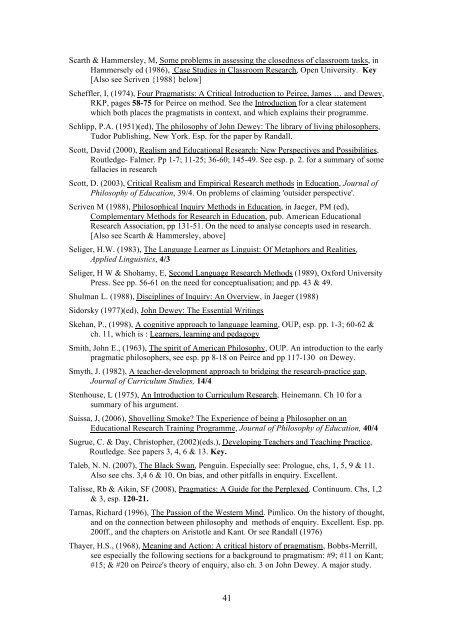RADICAL TEFL
2hqhXJd
2hqhXJd
Create successful ePaper yourself
Turn your PDF publications into a flip-book with our unique Google optimized e-Paper software.
Scarth & Hammersley, M, Some problems in assessing the closedness of classroom tasks, in<br />
Hammersely ed (1986), Case Studies in Classroom Research, Open University. Key<br />
[Also see Scriven {1988} below]<br />
Scheffler, I, (1974), Four Pragmatists: A Critical Introduction to Peirce, James … and Dewey,<br />
RKP, pages 58-75 for Peirce on method. See the Introduction for a clear statement<br />
which both places the pragmatists in context, and which explains their programme.<br />
Schlipp, P.A. (1951)(ed), The philosophy of John Dewey: The library of living philosophers,<br />
Tudor Publishing, New York. Esp. for the paper by Randall.<br />
Scott, David (2000), Realism and Educational Research: New Perspectives and Possibilities,<br />
Routledge- Falmer. Pp 1-7; 11-25; 36-60; 145-49. See esp. p. 2. for a summary of some<br />
fallacies in research<br />
Scott, D. (2003), Critical Realism and Empirical Research methods in Education, Journal of<br />
Philosophy of Education, 39/4. On problems of claiming 'outsider perspective'.<br />
Scriven M (1988), Philosophical Inquiry Methods in Education, in Jaeger, PM (ed),<br />
Complementary Methods for Research in Education, pub. American Educational<br />
Research Association, pp 131-51. On the need to analyse concepts used in research.<br />
[Also see Scarth & Hammersley, above]<br />
Seliger, H.W. (1983), The Language Learner as Linguist: Of Metaphors and Realities,<br />
Applied Linguistics, 4/3<br />
Seliger, H W & Shohamy, E, Second Language Research Methods (1989), Oxford University<br />
Press. See pp. 56-61 on the need for conceptualisation; and pp. 43 & 49.<br />
Shulman L. (1988), Disciplines of Inquiry: An Overview, in Jaeger (1988)<br />
Sidorsky (1977)(ed), John Dewey: The Essential Writings<br />
Skehan, P., (1998), A cognitive approach to language learning, OUP, esp. pp. 1-3; 60-62 &<br />
ch. 11, which is : Learners, learning and pedagogy<br />
Smith, John E., (1963), The spirit of American Philosophy, OUP. An introduction to the early<br />
pragmatic philosophers, see esp. pp 8-18 on Peirce and pp 117-130 on Dewey.<br />
Smyth, J. (1982), A teacher-development approach to bridging the research-practice gap,<br />
Journal of Curriculum Studies, 14/4<br />
Stenhouse, L (1975), An Introduction to Curriculum Research, Heinemann. Ch 10 for a<br />
summary of his argument.<br />
Suissa, J, (2006), Shovelling Smoke? The Experience of being a Philosopher on an<br />
Educational Research Training Programme, Journal of Philosophy of Education, 40/4<br />
Sugrue, C. & Day, Christopher, (2002)(eds.), Developing Teachers and Teaching Practice,<br />
Routledge. See papers 3, 4, 6 & 13. Key.<br />
Taleb, N. N. (2007), The Black Swan, Penguin. Especially see: Prologue, chs, 1, 5, 9 & 11.<br />
Also see chs. 3,4 6 & 10. On bias, and other pitfalls in enquiry. Excellent.<br />
Talisse, Rb & Aikin, SF (2008), Pragmatics: A Guide for the Perplexed. Continuum. Chs, 1,2<br />
& 3, esp. 120-21.<br />
Tarnas, Richard (1996), The Passion of the Western Mind. Pimlico. On the history of thought,<br />
and on the connection between philosophy and methods of enquiry. Excellent. Esp. pp.<br />
200ff., and the chapters on Aristotle and Kant. Or see Randall (1976)<br />
Thayer, H.S., (1968), Meaning and Action: A critical history of pragmatism, Bobbs-Merrill,<br />
see especially the following sections for a background to pragmatism: #9; #11 on Kant;<br />
#15; & #20 on Peirce's theory of enquiry, also ch. 3 on John Dewey. A major study.<br />
41


